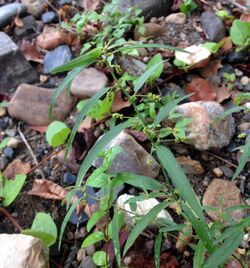Biology:Acalypha monococca
| Acalypha monococca | |
|---|---|

| |
| Scientific classification | |
| Script error: No such module "Taxobox ranks".: | Plantae |
| Script error: No such module "Taxobox ranks".: | Tracheophytes |
| Script error: No such module "Taxobox ranks".: | Angiosperms |
| Script error: No such module "Taxobox ranks".: | Eudicots |
| Script error: No such module "Taxobox ranks".: | Rosids |
| Script error: No such module "Taxobox ranks".: | Malpighiales |
| Script error: No such module "Taxobox ranks".: | Euphorbiaceae |
| Script error: No such module "Taxobox ranks".: | Acalypha |
| Script error: No such module "Taxobox ranks".: | <div style="display:inline" class="script error: no such module "taxobox ranks".">A. monococca |
| Binomial name | |
| Acalypha monococca (Engelm. ex A.Gray) Lill. W. Mill. & Gandhi
| |
Acalypha monococca, commonly called slender threeseed mercury,[2] is a species of flowering plant in the spurge family (Euphorbiaceae). It is native to North America, where it is found in the South Central and Midwestern regions of the United States, primarily west of the Mississippi River.[3][4] Its natural habitat is in dry, sunny, sandy or rocky areas, in prairies, barrens, or woodlands.[4][5]
Acalypha monococca in an erect annual, growing to around 40 cm tall.[4] Its flowers are produced from summer to fall.[4] It is similar to Acalypha gracilens, which occupies a generally more easterly range from Acalypha monococca. Characteristic features for distinguishing Acalypha monococca include its single-seeded fruits, narrower leaves, smaller stature.[6]
References
- ↑ "NatureServe Explorer - Acalypha monococca". NatureServe. 2022-06-22. https://explorer.natureserve.org/Taxon/ELEMENT_GLOBAL.2.136536.
- ↑ "Acalypha monococca". Natural Resources Conservation Service PLANTS Database. USDA. https://plants.usda.gov/core/profile?symbol=ACMO4. Retrieved 30 January 2019.
- ↑ "Acalypha monococca", County-level distribution map from the North American Plant Atlas (NAPA) (Biota of North America Program (BONAP)), 2014, http://bonap.net/MapGallery/County/Acalypha%20monococca.png, retrieved 30 January 2019
- ↑ 4.0 4.1 4.2 4.3 Acalypha monococca Flora of North America
- ↑ Diggs, George; Lipscomb, Barney; O'Kennon, Robert (1999). Flora of North Central Texas. Botanical Research Institute of Texas. p. 588. http://artemis.austincollege.edu/acad/bio/gdiggs/NCTXpdf.htm.
- ↑ Yatskievych, George (2006). Flora of Missouri, Volume 2. Missouri Botanical Garden Press. pp. 1014.
Wikidata ☰ Q15288308 entry
 |

